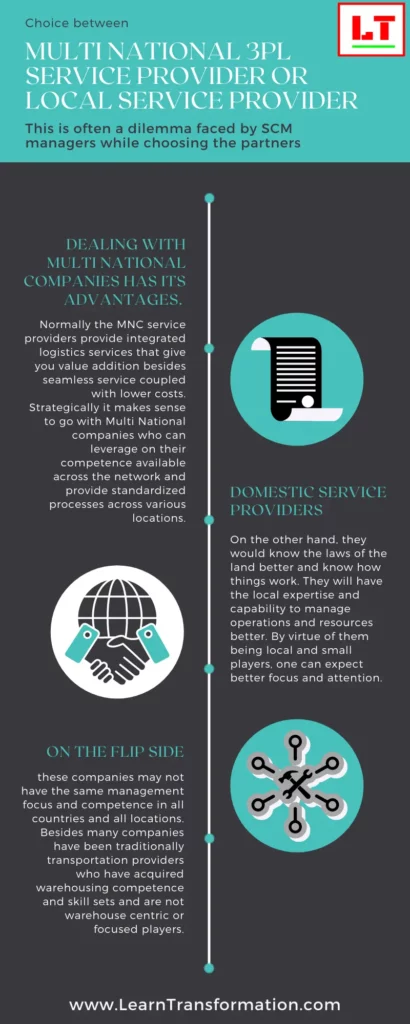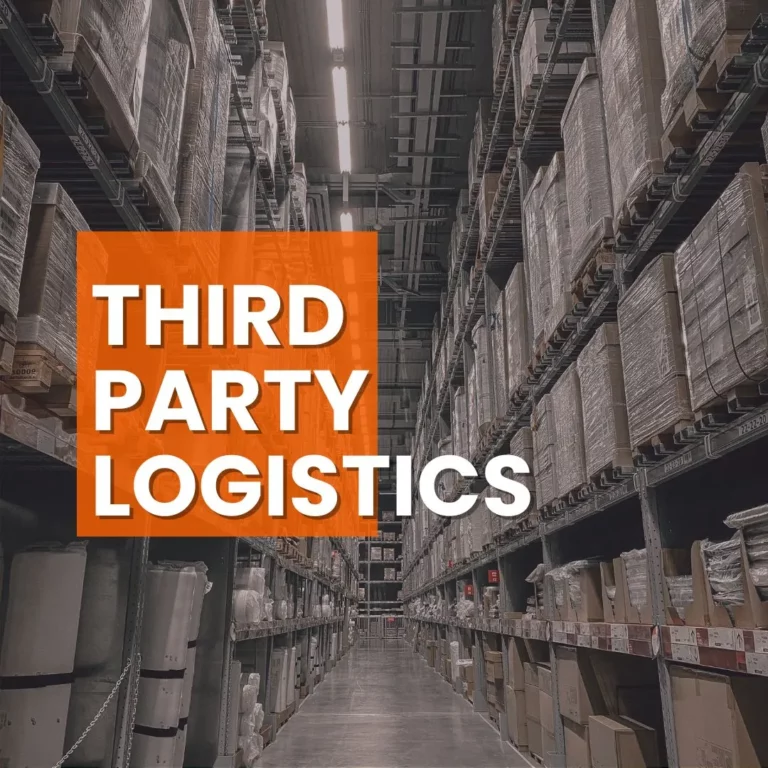The tactics…no, amateurs discuss tactics,…. Professional soldiers study logistics
Tom Clancy
Simply defined, 3PLs are used to contract with outside parties to handle the warehouse and distribution requirements for their clients’ inventory and fulfillment. A company that specialists in providing services to help manage the supply chain, such as warehouse management, order fulfillment, and shipping orders, is known as a logistics service provider, sometimes known as a third-party logistics (3PL) provider.
Third-Party Logistics is referred to as 3PL. It alludes to the practise of contracting out supply chain management and logistics work to other companies. A 3PL supplier provides a variety of services, such as order fulfilment, inventory management, warehousing, shipping, and other value-added services.
Also read: Understanding 3PL And Why It Is Beneficial For Your Business?
Businesses must carefully consider this choice because it can have a big impact on the effectiveness and efficiency of their logistical operations. When choosing a 3PL provider, keep the following things in mind:
- Services offered: Services provided Make sure the 3PL supplier offers the services you require after assessing your unique logistics requirements. Additionally, take into account elements like transportation networks, value-added services, and warehousing capacity. Thus, the provider should be compatible with your company’s needs and industry sector.
- Experience and expertise: expertise and experience Analyse the 3PL provider’s experience and knowledge. Look at their history of overseeing logistics operations, especially in your sector. Take into account how well they are aware of industry standards, compliance laws, and best practises.
- Scalability and flexibility: Determine whether the 3PL provider can meet both the present and future demands of your company. Additionally, take into account how well they can scale operations, manage seasonal variations, and adjust to changes in your company’s needs. Furthermore, to ensure that the provider can expand with your organisation, flexibility is essential.

Companies are continually looking for ways to optimise their supply chain operations to stay competitive in today’s quickly changing business environment. Third-party logistics providers (3PLs) are a useful tactic that has grown in favour over the years for outsourcing logistical tasks. The notion of 3PL (Third-Party Logistics) is examined in this article, along with the vital factors that firms must take into account when choosing the best 3PL supplier.
Recognising 3PL
The practise of outsourcing all or a portion of a company’s logistics and supply chain management functions to an outside source is known as third-party logistics, or 3PL for short. Further, these duties could include packing, labelling, order fulfilment, distribution, transportation, warehousing, inventory management, and other value-added services. Moreover, companies can lower expenses, increase productivity, and get access to specialised knowledge by working with a 3PL provider, freeing them up to concentrate on their core capabilities.
The Advantages of 3PL
Understanding the potential advantages of outsourcing logistics functions is crucial before beginning the process of choosing the best 3PL provider:
- Savings: Because 3PL providers frequently have established networks and infrastructure, they can take advantage of economies of scale. Thus, reduced transportation expenses, improved inventory management, and effective order fulfilment all result in cost savings for their customers.
- Resources and Knowledge: 3PLs bring specialised technology and knowledge to the table. Further, they are knowledgeable about the most recent business trends and have access to cutting-edge logistics technologies and software, which help them to optimise operations and adjust to shifting market conditions.
- Scalability: As a business expands, its logistics needs may change. A 3PL can provide scalability, enabling businesses to quickly scale up or down their logistics operations as needed without making significant capital commitments.
- Focus on Core Competencies: By outsourcing logistics tasks, businesses can avoid becoming bogged down in the complexities of supply chain management and instead focus on their core competencies and strategic projects.
Leader’s Tip
Clearly defining your company’s logistics goals and needs should be your first step.
Choosing the Best 3PL Provider.
Selecting the ideal 3PL provider is a crucial choice that can have a big impact on a business’s success. The following are crucial elements to think about before making this decision:
- Specify your goals.
Establishing your company’s logistics objectives and goals should be your first step. What particular services do you require from a 3PL company? Do you want to increase your global reach, save costs, speed up delivery, or improve customer service? Thus, finding a provider with the necessary knowledge and skills to suit your needs will be easier if you are aware of your goals. Be sure to fully comprehend your supply chain and logistics requirements before looking for a 3PL provider. Take into account elements such as your delivery volume, regional reach, industry-specific needs, and any particular specifications your company may have.
- Industry Knowledge
Consider the experience the possible 3PL provider has had in your sector. It might be really helpful to comprehend the particular issues, rules, and best practises in your business. Additionally, request references and case studies to evaluate their prior success in comparable settings. Industry expertise is important when picking a 3PL provider since it guarantees the provider can satisfy your specific needs, overcome problems in the industry, and help your firm succeed and expand. Consider their experience and knowledge in your sector as a crucial selection criterion when assessing possible 3PL partners.
- Transportation and Infrastructure
In today’s hectic logistics climate, a 3PL supplier with cutting-edge technology is crucial. Ask about their IT skills, such as real-time tracking, transportation management systems, and warehouse management systems. Additionally, its infrastructure has to be strong enough to accommodate both your present and future needs. When choosing a 3PL provider, transportation and infrastructure are crucial components of supply chain management that should not be overlooked. Your logistics operations’ efficacy, dependability, and cost-effectiveness will directly depend on the provider’s skills and compatibility with your unique transportation and infrastructure requirements.
- Geographical scope
Take the 3PL provider’s geographic reach into account. Moreover, partnering with a provider with a worldwide network can be beneficial if your firm operates internationally or plans to develop abroad. Furthermore, international logistics can be streamlined with the assistance of a 3PL with a strong presence in important areas. Take into account the facilities and reach of the 3PL supplier. Pick one that has distribution centres or warehouses that are well-positioned to serve your target markets.
- Service Provisioning
Examine the full range of services the 3PL supplier offers. Further, make sure they are capable of meeting your immediate needs and flexible enough to satisfy your changing needs. Transportation, warehousing, inventory control, e-commerce fulfilment, and value-added services like kitting and packaging are some examples of services. Establish service level agreements (SLAs) and key performance indicators (KPIs) that are in line with your objectives. Areas like order accuracy, shipping delays, inventory correctness, and customer service should all be covered by these measurements.
- Safety Monitoring and Compliance
Inquire about the provider’s quality assurance procedures and adherence to relevant rules and laws. This is especially important if your business, like that of pharmaceuticals or food items, has strict regulations.Thus, verify that they have the required certifications and adhere to the best security and safety practises.
Also check out: How Supply Chain 4.0 And Logistics 4.0 Will Increase Efficiency By 5x?
- Pricing Framework
Recognise the provider’s price policies and billing practises. Are costs disclosed and is there possibility for bargaining? Be wary of companies who offer costs that are noticeably cheaper because this may be a symptom of poor service quality.
- Flexibility and Scalability
The provider’s capacity to scale their services to meet your evolving needs should be evaluated. Can they adjust for demand peaks and valleys throughout the year? Do they have backup measures in place in the event of unforeseen disruptions like natural catastrophes or labour disputes? Your 3PL partner should have the flexibility to scale its offerings up or down to meet your shifting business requirements. Make sure they can withstand seasonal changes or quick expansion.
- Feedback from clients and reviews
Ask consumers or customers who have used the 3PL provider for their opinion. Their encounters might offer insightful information on the provider’s dependability, responsiveness, and general performance.
- Collaboration and Communication
Collaboration and effective communication are essential for a successful cooperation. Additionally, make sure the 3PL provider’s communication style fits the needs of your business and that they respond quickly to questions and complaints. An effective cooperation depends on effective communication. Verify that the 3PL provider’s proactive and responsive communication style meets your requirements.
- Data Security and Confidentiality
Handling sensitive data, like customer and inventory information, is a part of logistics. Check to see if the 3PL supplier has strong data security protocols in place to safeguard your information from hacks and other online dangers.
- Initiatives in Environmental and Sustainability
A 3PL provider’s dedication to sustainability should be taken into account in the environmentally sensitive world of today. Incorporating eco-friendly practises into your business relationships can help you live up to your company’s principles and lessen your carbon footprint.
Leader’s Tip
Seek out 3PL companies with expertise in your sector or a relevant one.
3 Best 3PL Books
Global Reader’s Click Below:
- How to Win Friends and Influence People
- Extreme Ownership: How U.S. Navy SEALs Lead and Win (New Edition)
- The 7 Habits of Highly Effective People: Habit Tracker
India Reader’s Click below:
- Dr. Binay Singh’s Guide to Leadership Training
- Leadership Essentials You Always Wanted to Know (Self-Learning Management Series)
- The 5 Levels Of Leadership : Proven Steps To Maximize Your Potential
Conclusion
A crucial choice that can have a big effect on your company’s productivity, competitiveness, and bottom line is choosing the right 3PL provider. It necessitates careful evaluation of a number of variables, including your goals, experience in the business, technological prowess, geographic reach, and service offerings. You may create a strategic collaboration that improves your supply chain and boosts the success of your company overall by doing extensive due diligence and choosing a 3PL provider who matches your unique demands and values. The ideal 3PL supplier, keep in mind, becomes an extension of your team, working together to meet your logistical goals and advance your company in the competitive market of today.
Key Takeaways
- Companies seek supply chain optimization; 3PL providers offer competitive advantages.
- Consider 3PL’s global reach for efficient international logistics partnership.
- Strategic 3PL partnership enhances supply chain, drives overall business success.
FAQs
What makes a good 3PL provider?
Establishing your company’s logistics objectives and goals should be your first step. What particular services do you require from a 3PL company? Do you want to increase your global reach, save costs, speed up delivery, or improve customer service? Hence, finding a provider with the necessary knowledge and skills to suit your needs will be easier if you are aware of your goals.
How do I choose the right third-party logistics provider?
Consider the experience the possible 3PL provider has had in your sector. It might be really helpful to comprehend the particular issues, rules, and best practises in your business.Additionally, request references and case studies to evaluate their prior success in comparable settings.
For exclusive content:

